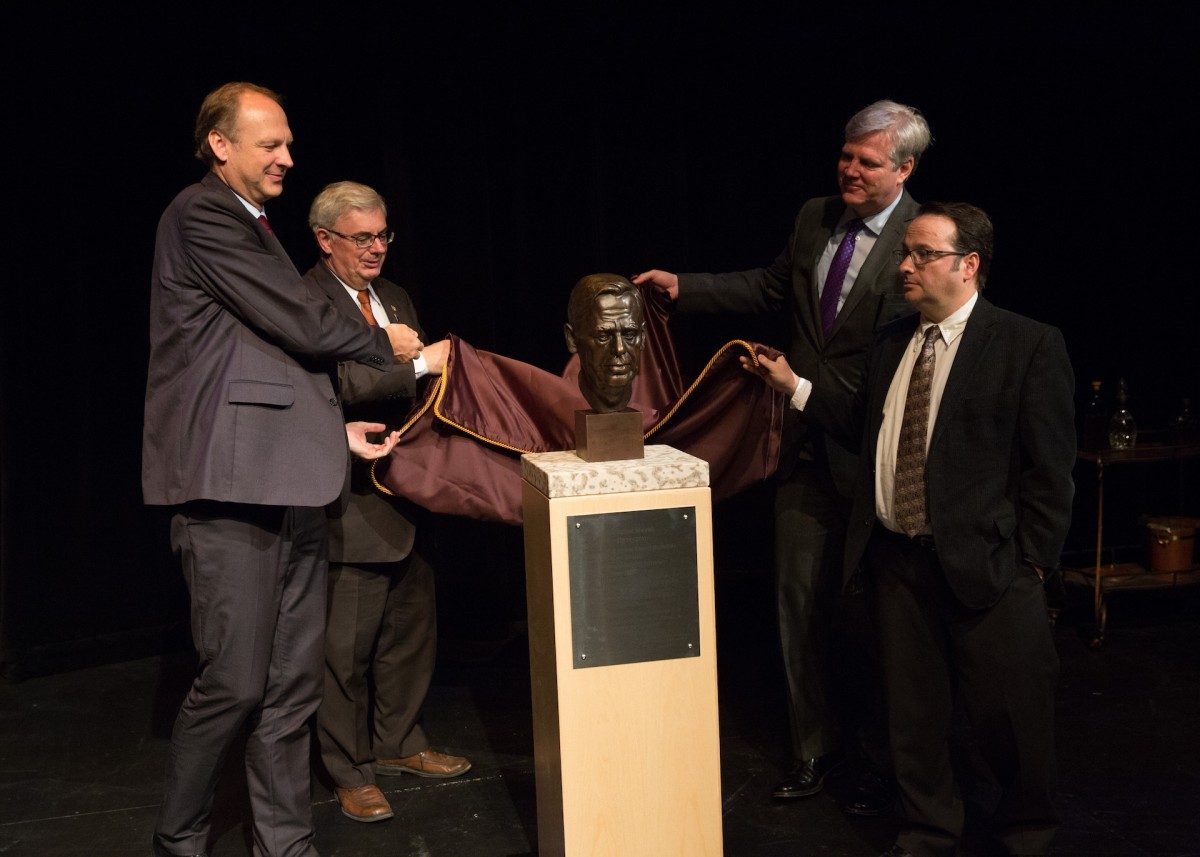
L-R, Pavel Hrnčíř, Ambassador of the Czech Republic; David Barnard, President of the U of M; Dr. John Young, President and CEO of the Canadian Museum for Human Rights; and Dr. Bill Kerr, associate professor, Faculty of Arts unveil a bust of Václav Havel on June 14, 2017. // Photo by Mike Latschislaw
Sculpture of former Czech president unveiled
On June 14, 2017, a sculpture of Václav Havel was unveiled at the University of Manitoba in the John J. Conklin Theatre, within the Taché Arts Project.
His Excellency Václav Havel [LLD/99] (1936-2011) was the last President of Czechoslovakia (1989–92) and the first President of the Czech Republic (1993–2003).
An influential Czech playwright, poet, and political dissident, he founded and led the Civic Forum Movement and by means of a non-violent “Velvet Revolution” helped to facilitate a transition to democracy in 1990.
In April 1999, Havel was bestowed with an honorary Doctor of Laws from the University of Manitoba.
The sculpture of Václav Havel was specially commissioned as an Art for Amnesty project and is one of five identical pieces created by Marie Seborova, two of which are currently displayed in the Irish Parliament and the National Autonomous University of Mexico. The two remaining busts will be showcased in the European Parliament and at Columbia University.
This project is supported by the Václav Havel Library Foundation in New York, and the bust is graciously being given to the University of Manitoba and the Canadian Museum for Human Rights from Pavel Hrnčíř, Ambassador Extraordinary and Plenipotentiary of the Czech Republic to Canada, on behalf of the Czech Republic.
Václav Havel was Resident Playwright in Prague’s Theatre on the Balustrade. He wrote for many literary and theatrical periodicals, and saw several of his first plays produced, including The Garden Party (1963), The Memorandum (1965) and The Increased Difficulty of Concentration (1968).
His plays and other writings contributed significantly to the reawakening of Czechoslovak society, which culminated in the “Prague Spring” of 1968, during which attempts to loosen restrictions on travel and free speech were countered with a Soviet invasion of the country.
Havel emerged as a leading opponent of the repression that followed, and as a consequence, his literary works were banned in Czechoslovakia.
Between 1978 and 1989, Havel endured repeated periods of house arrest and imprisonment, the longest of which was for nearly five years.
Havel famously noted: “There is only one way to strive for decency, reason, responsibility, sincerity, civility and tolerance: and that is decently, reasonably, responsibly, sincerely, civilly, and tolerantly. I’m aware that in everyday politics this is not exactly a practical way of going about it.”
When Havel died in 2011, University of Manitoba President and Vice-Chancellor David Barnard noted: “Vaclav Havel knew both the struggle for human rights as well as the triumph of succeeding in that struggle. He spoke out and sacrificed his freedom so others could be free. His accomplishments on behalf of the Czech people and the world are a legacy that we shall continue to learn from and honour.”






